Admittedly, I haven’t been one to appreciate the art of shopping second-hand.
The thought of buying something used was always a little off-putting to me.
Since becoming a minimalist, this didn’t change much, as I associated people who shop second hand, with people who have a lot of things.
It’s the constant “looking” for bargains that separates frugal livuing and minimalist living.
Beyond that, I just like new things. I like knowing that I’m the first person to use a product fresh out of the packaging. It makes me feel like I’m in control of my purchase.
But the mentality of wanting new things hasn’t served me or the environment well over the years. My desire for new, led me to debt and supporting industries that generate waste and unethical practices.
If you’ve been following this blog, you’ll know that we have plans of eventually moving to Europe. We’ll be taking everything we can from Australia, but inevitably, we’ll need to to buy some basics for our new home.
Will we buy new or used to fit out our apartment? And when it comes to living a minimalist, vegan and sustainable lifestyle, is shopping second hand better than buying new?
These are the types of questions we’ll need to address. And that’s what I’m about to answer in this post.
I’m going to kick off with some genuine concerns about second-hand shopping, before discussing the benefits of buying used, and some tips to get started.
Concerns about shopping second-hand
I’ve already touched on my resistance to buying used things, but I want to unpack them fully. The reasons for not wanting to shop second-hand play a massive role in how we can shift our paradigm.
Not going to find what you want
It’s hard enough trying to find a product new. Then you add the complexity of finding products that are ethical, sustainable and vegan-friendly, and things just get a lot harder.
THEN you remove all new products from your options, and things get harder again. This is perhaps my greatest fear when thinking about shopping second-hand.
So much more time and research is needed to go into shopping for things, quite often with no result. If you’re already time-poor, this idea is terrifying!
Read more: 15 Minimalist Shopping Tips To Help You Master Your Temptations Today
You may receive a faulty product
When you buy brand new, you’re generally supported by some warranty or consumer law. So if your product is defective, you can return, exchange or get it repaired.
When shopping second-hand, there isn’t the same level of accountability, which means more risk.
Can you trust the seller?
Many transactions involving used items are conducted between two individuals as opposed to an individual and a business.
An established business has its reputation to uphold, so they do everything they can to build trust with their customers.
When you interact with someone in an online marketplace or in person, with little chance of seeing them again, there’s no incentive for the seller to build trust with the buyer.
As someone who used to work in technology, I’ve seen countless examples of someone buying a used iPhone, only to find out that there was a hard lock on the device, and they couldn’t access it. When the buyer tried to reach out to the seller, there was no response. So in the end, they purchased an unusable phone. Not cool!
Compromised conditions
Some people want to control the whole experience of buying a product and are happy to pay more for something new.
The moment a product is used, the condition will never be the same. We see this a lot in the car industry. As soon as you drive a new car out of the showroom, the value drops significantly.
This is something you have to come to terms with if you’re going to start shopping second-hand.

Is the product genuine?
If you have plans of on-selling your second-hand goods, a big part of retaining value is going to come down to the integrity of the product.
Some products, like genuine sneakers, can appreciate depending on the market trends. So product integrity becomes even more critical in this context.
Buying second-hand makes it harder to validate the integrity of the product you’re buying.
Shorter lifespan
When shopping second hand, you’re buying a used product. It’s only logical to presume that life in the product is less than what it was if you were to purchase the product new.
With a tighter lifespan, you’ll need to buy more frequently, thus increasing your consumption habits.
Benefits of shopping second-hand
Okay, so now that I’ve covered off on the concerns of shopping second-hand, it’s time to get into some legitimate reasons why we should buy second-hand.
Extend the lifecycle of a product
Considering the lifecycle of a product, even before you purchase it is something we’ve advocated for some time.
Thinking about the lifecycle pushes us to consider the quality, how we plan to use it if it’s repairable, and how we’ll discard it once we’ve used it to its capacity.
One of the options for discarding a product is to on-sell or give it away. Even though you no longer need it, someone else might. This is a far more sustainable alternative to throwing products in the trash, contributing to the incredible waste.
This point in itself should be motivating enough to buy more second-hand goods.
Slow down consumption
Extending the lifecycle of products also means slowing down the rate of excessive consumption, which means less waste, emissions, unfair wages and animal cruelty.
Instead of generating waste, we’re creating a circular economy of re-distributing “would-be” discarded products and giving them a new life.
The knock-on effect is that the demand for new products would decrease, which would force producers to reduce their supply.
Ultimately, shopping second-hand means that we’re more resourceful as a society.
Encourages community building
Earlier I mentioned the risks associated with dealing with people-to-people transactions instead of people-to-business transactions.
However, that’s only looking at the worst-case scenario. For as many bad transactions as we have with second-hand deals, there are ten more positive ones. Okay, I just made that number up. But it feels about right 🙂
So what’s so good about these deals? Well, buying and selling from other people builds a sense of community.
For example, we sold our bed frame to some guy on Facebook. He brought over a truck to pick up the bed. In the 20 minutes he was in our home, he helped us dismantle the bed, he bought a few more other items, and we were able to talk about the history of the things he just bought from us.
Furthermore, he happened to share a lot of views on the world as we do, so we had a stimulating conversation about macro-level consumerism.
It doesn’t seem like much, but in that 20-minute interaction we:
- Sold more things we wanted to get rid of, instead of creating more waste
- We met a new person who expanded our perspective
- He validated to himself that buying a bed frame second-hand was the right decision
- We proved to ourselves that persisting in selling things second-hand was the right decision
- The bed gets to have a new life thus extending its life
Buying and selling amongst each other, while inconvenient at times, is an incredibly humanising experience.
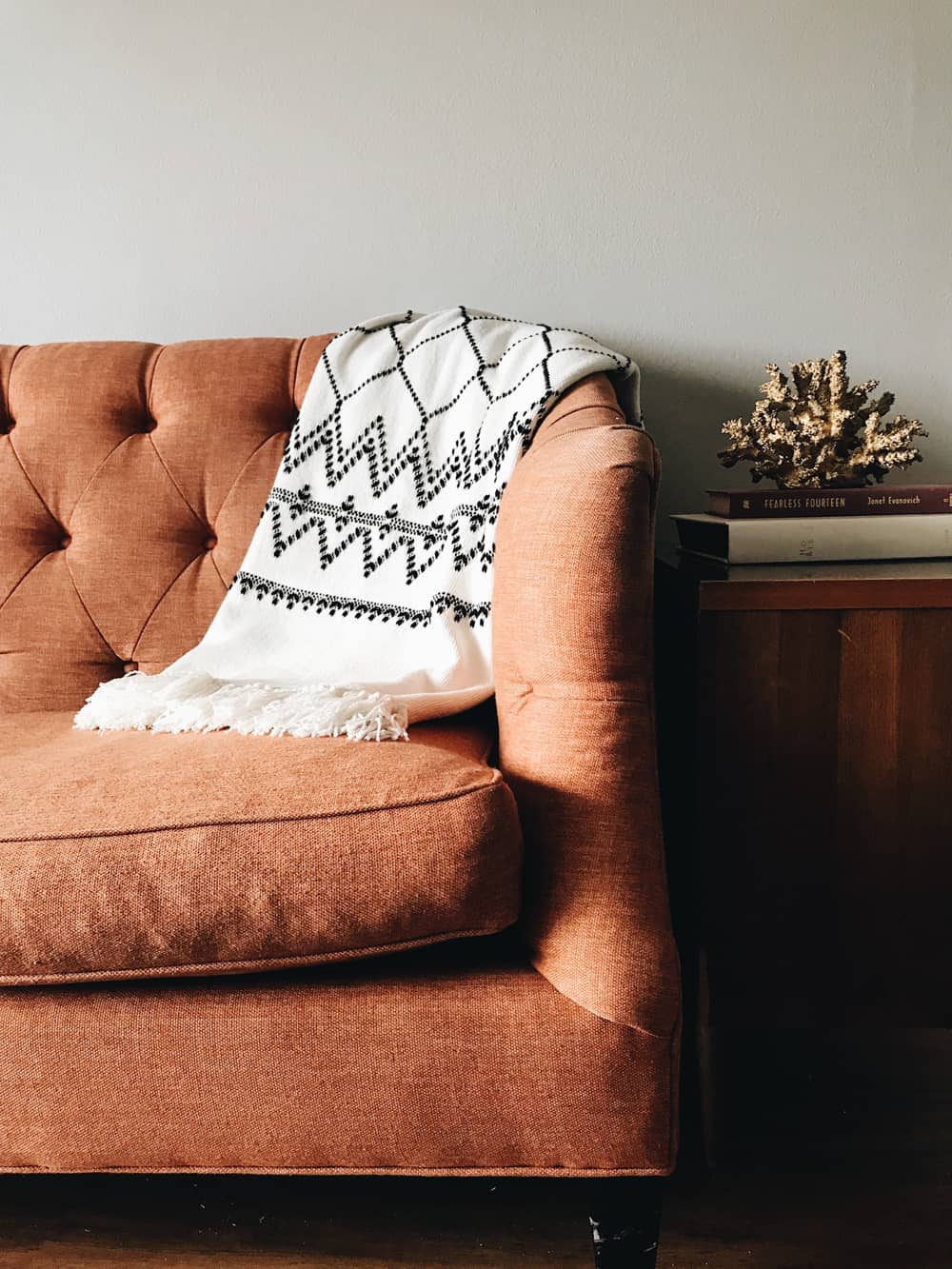
You may not always get what you want, and that’s a good thing
Wait, why would it be a good thing not to get what you want?
See, when buying an item brand new, you know exactly what you’re getting. Certainty is the expectation.
But when you buy a used product, quite often, you need to settle for something that you wouldn’t have otherwise bought.
In the family home I grew up in, we’ve had a total of three lounge sets between 1994 and today. The first of which was a second-hand set my parents bought. It had a pinkish, purple colour, and I vividly remember the cigarette burn on the single-recliner chair.
The latter purchases were brand new. Do you want to know which lounge I liked the most? You go it, the second-hand one.
And it’s not because of the memories associated with that specific couch, although there are many great ones! It’s because it was by far the most comfortable couch we ever owned—and I was sad to see it go.
I’m sharing this story because I imagine you’ve been pleasantly surprised with a second-hand purchase before. You naturally lower your expectations when you buy used products, and that’s a good thing.
We put so much pressure in finding the perfect product when shopping for new things, and sometimes that means we don’t appreciate the purchase as much—because we expect it to perform. I mean, it better, considering how much we paid for it!
There’s a real sense of pride in thrifting an item that over-delivers.
It’s cheaper to buy second-hand
Ha! You would have thought this would be the first benefit I mentioned.
It’s undeniable, buying used is more affordable than buying new. That’s why many of us shop second-hand.
You can save yourself thousands of dollars by buying second-hand. I just watched a video about a 20-year-old girl living in a van for the past two years. She fitted out the van with mainly second-hand products and the vehicle itself cost her $2,500 used.
In the end, she’s avoiding paying someone else’s mortgage, and she built her mobile home relatively cheaply by leveraging used products. This is a pretty extreme example of keeping costs down, but it certainly makes a point.
Shopping second-hand, if used with intention, is a mindset that can save you a ton of money.
So how do you get started with second-hand shopping?
Tips for shopping second-hand
The goal when buying any product, especially second-hand, is to feel confident in your purchase. Below are some tips to keep in mind to feel confident in your decision to buy used items.
Where to buy second-hand products
Access to used goods comes down to where you live and what’s available in your area.
Luckily, technology has enabled us to leverage the internet to broaden our options. Below is a summary of where you can look to do your second-hand shopping.
Charity shops
Also known as an “Op (opportunity) Shop” in Australia, charity shops accept donated products and on-sell them to the public. Type in “charity shop near me” in Google to find a list of shops in your local area.
Make sure to visit their website first to see what types of products they accept. For example, one of the shops in my area doesn’t take electronic goods, mattresses and prams. Knowing this in advance will save you time.
Vintage shops
Also commonly known as thrift stores, vintage shops buy quality used items and then mark them up for a profit—which can either be cheaper or more expensive still than new products, depending on the rarity. Thrift stores typically have a defined range of products and styles to present a consistent brand to their customer base.
You can find them in your area by typing “vintage/thrift shops near me” into Google. As products in vintage shops usually sell quickly, due to their strict curation, you may consider following them on social media as they regularly post new items available. If you see something you like, it’s up to you to move quickly to look at it before it’s sold.
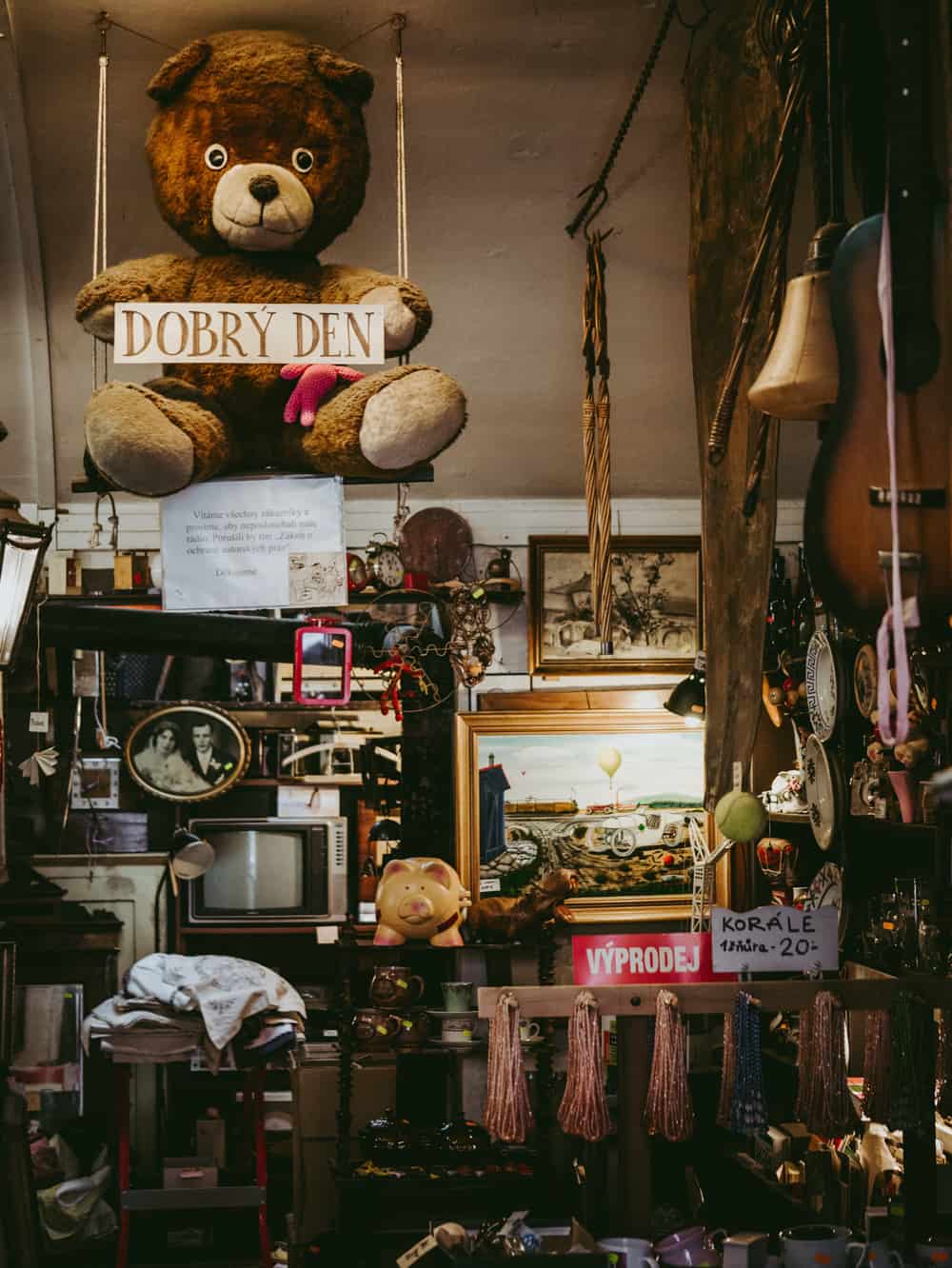
Swap shops
In recent years, there’s been a growing movement around pay-it-forwards. It’s a small community of people who choose to give away their items to people who want them. It’s a lovely concept, and the vibe in these groups is usually quite positive.
The best way to give or receive second-hand things is to join a pay-it-forward Facebook group. Type “pay it forward <insert your city>” into the Facebook search to see if there’s a group in your area. Outside of Facebook, there are other swap shops, notably with books. Type in “swap shops near me” in Google to see what’s available.
Now while there isn’t a monetary exchange in these swapping groups, it’s expected that the receiver will pick up the product from the giver. This may seem like a small deal, but when it comes to decluttering, it’s very helpful to have people come and take things away from you, even if it’s free. Otherwise, we can sometimes procrastinate or worse, we leave things in our car for weeks on end.
Online marketplace
One of the most popular ways to buy second-hand is through online platforms like Facebook Marketplace and eBay. There are many others, again depending on your country and city. There is one in Australia called Gumtree.
These are websites where people post their used products, often with an image, description and price. The seller sometimes needs to mail the product to the buyer, depending on where they are.
I encourage you to look past the big well-known marketplaces when trying to find products. For example, we discovered a fantastic online shop for wedding dresses, where Maša was able to sell her dress very quickly. Once you know what you need to buy, type “second-hand <insert product> online” into Google to see what comes up.
Sometimes I like to type in “best second-hand shops online in <insert country>” to get a list of marketplaces. From there, you can sign up to be notified via email of specific products as they become available.
Google the product
Whether you’re thrifting in-store or online, try to Google the product you’re considering.
This won’t always work if the product is vintage, but it’s worth a try.
The key here is quickly finding a product number, brand or model that you can reference in your search. If you find the product, you’ll be able to look at reviews, get an idea of the original price and build confidence in the product.
If this is a more expensive product like a computer or vehicle, you might be able to find more specific information like recalls on particular parts, for example.
Manage your expectations
Before you become the best thrift shopper in the world, you need to set your expectations. Shopping second-hand can be as much fun as it can be frustrating. Here are four hard truths you need to be prepared for:
- You’ll miss out on products – you’ve found the perfect size shoe in the perfect colour, only to find when you come back for it, someone else has bought it. This can be devastating, so be sure to play the numbers game. For instance, you need to be prepared to bid on five pairs of shoes to finally get one pair you’re happy with.
- Have patience and persist – sometimes it will feel like you’ll never find what you want, until bang! After looking for what seemingly feels like months, you find exactly what you’re after. It’s a testing process, and you need to expect it to take longer than buying new.
- You’ll get frustrated with people – you’ll have buyers trying to bargain with you at your front doorstep even though you’ve already agreed on a price. People will flake on you and not respond to your messages. Try to have little or no expectations of people, and only then you may be surprised when they’re polite and respectful 🙂
- You’ll get a faulty product – again, shopping second-hand is a numbers game. You’ll win, and you’ll lose. You just need to bank on the fact that you’ll win more than you’ll lose, and in the end, it will be worth it.
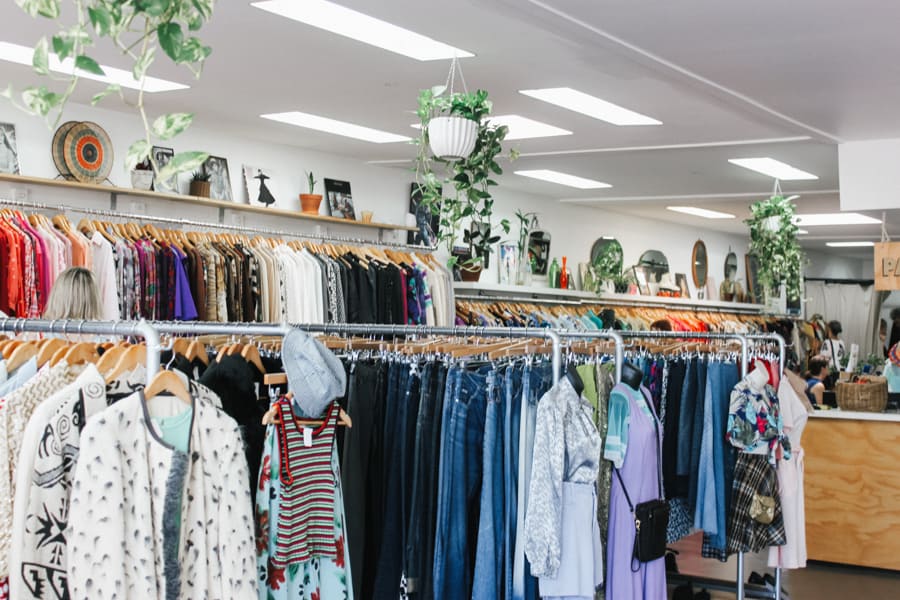
Reasons to buy new instead of shopping second-hand
As beneficial as it is to shop second-hand, it’s not a perfect system. There are times where shopping new is going to be your best option.
Below are three situations where it is best to buy new instead of shopping second-hand.
You can’t find what you need
Sometimes you need to buy something urgently, and you can’t afford the time to research and wait for a used item to become available.
If you need to make a quick decision, sure at least have a look to see if something is available online, but don’t waste too much time. If you can’t find what you’re looking for, buy new instead.
You want to support ethical, sustainable brands
I have a counterintuitive philosophy, which means spending more as a mindful consumer. I don’t mean you should be excessive, but I do feel it’s important to support ethical brands trying to do the right thing.
It’s our dollars that will keep these brands in business and continue to provide alternatives to the toxic and harmful products available to the masses.
However, I understand that this approach can be quite costly, so it’s best to find a balance between shopping second-hand and supporting sustainable brands.
You don’t want to be tempted to consume more than you need
As I explained earlier, the key to being an excellent thrift shopper is being alerted of products as they become available. This quite often means shopping at thrift stores consistently, signing up for email and social notifications, and seeking opportunities.
If you’re not careful, being “connected” to marketplaces may become an unhealthy habit—to the point where you consume more than you need.
We all have people in our lives that are continually doing deals, whether it’s buying something at a bargain, or on-selling their used products. It’s a job in itself, and a recipe for unnecessary clutter.
You get trapped in a mindset of “oh well, I can always sell it”. The principles of minimalism still apply to second-hand shopping. Develop a wishlist of what you need and proceed to find those products. Again, check second-hand first, if not available, go for something new.
But don’t get lost in bargains, opportunities and exchanges, just because you can. If you have good self-control, treat your second-hand shopping like an event. Set yourself a deadline on how long you’ll look for an item. If you can’t find anything within that timeframe, end your campaign. Unsubscribe from notifications and move on.
However, if you find it hard to go in and out of second-hand mode, it might be best to shop new instead. That way you can remove the fear of missing out on products and simply execute on what you need to buy, nothing more.
Is it okay for vegans to buy non-vegan products second-hand?
Before wrapping up this post, I wanted to make a quick note on something I’ve struggled with when it comes to shopping second-hand.
As a vegan, I avoid buying any products that come from an animal. This goes far beyond food as many products are made from silk, leather, wool, feathers, amongst other animal materials.
Many vegans feel that if the harm has already been done, then it’s okay to buy second-hand products made from animals. I agree that this is a much better alternative to purchasing animal products new and signalling to the market to produce more of the same cruel products.
Not only that, but it’s more resourceful to use products that are made regardless of whether they’re vegan or not. It’s hard to fault that logic.
But I have a different point of view on this matter.
Each one of us is a walking billboard. What we own, wear and consume represents who we are. And other people take notice.
The more people start to understand what veganism is, the more they will test you for your integrity. People are curious to see where you get your “leather” shoes from as a vegan.
Not only that, subconsciously we’re showing people it’s okay to consume these products. Most of the time, this won’t matter, as vegan-friendly products are looking more and more like the non-vegan versions.
But for me, personally, it matters. It’s important to me to be able to look in the mirror and know that what I own does not represent exploitation of animals. And I don’t want to leave any doubt or confusion when I represent myself and the animals to others.
Again, many people share a different view on this topic (including my wife). Still, I thought it was important to bring it up, as we’ll be presented with opportunities to buy non-vegan products when shopping second-hand. We need to make a decision we’re comfortable with.
What do you think is better? Shopping second-hand or buying new?
Over to you now! Let me know what you think in the comments below. Also, do you have any tips for balancing the need to find things second-hand, and drawing the line? I’d love to know!
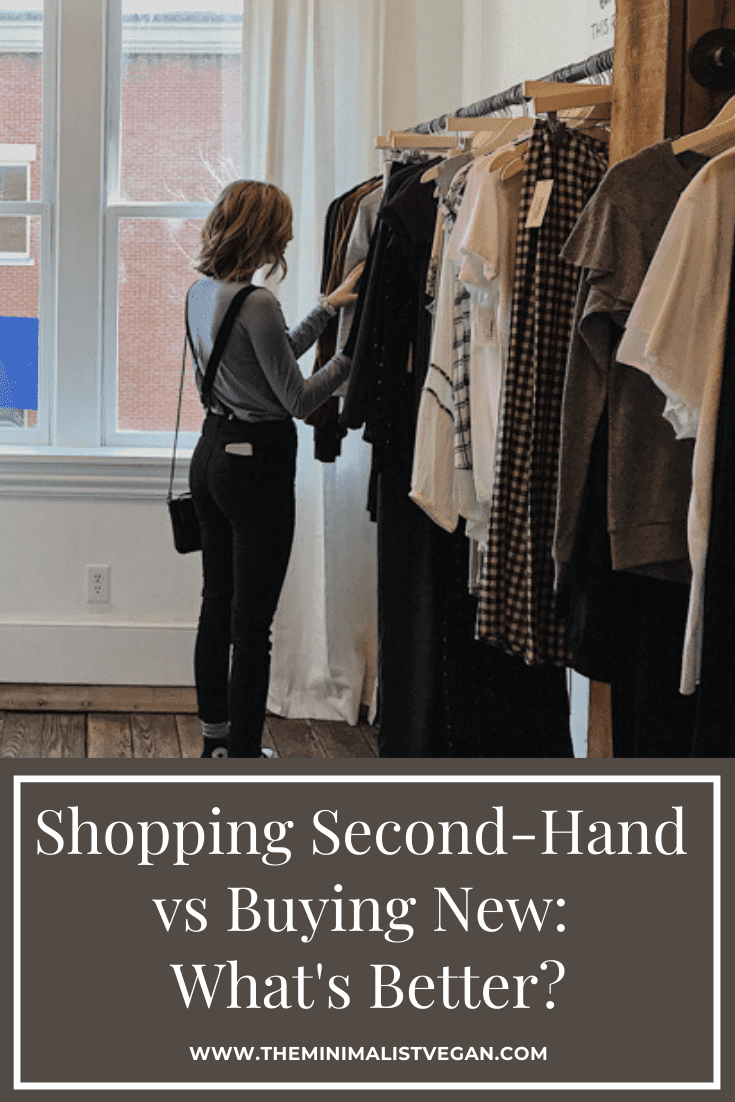

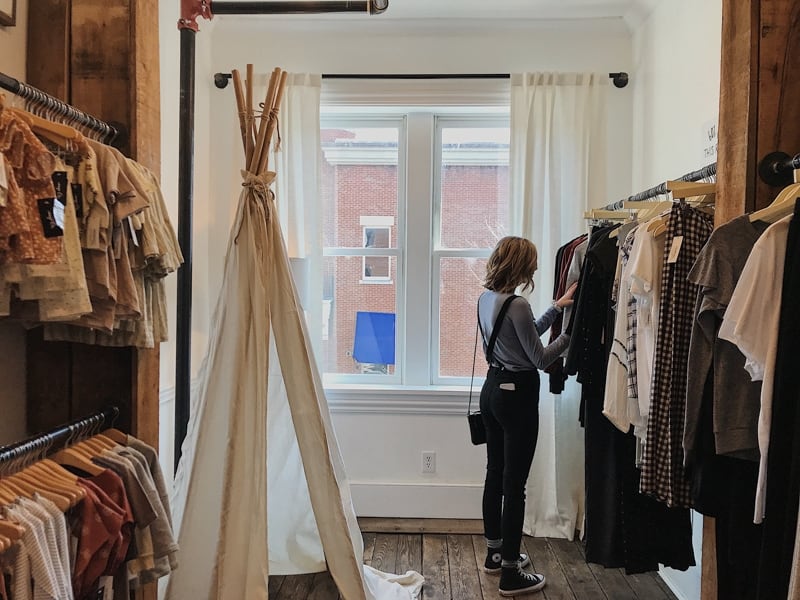
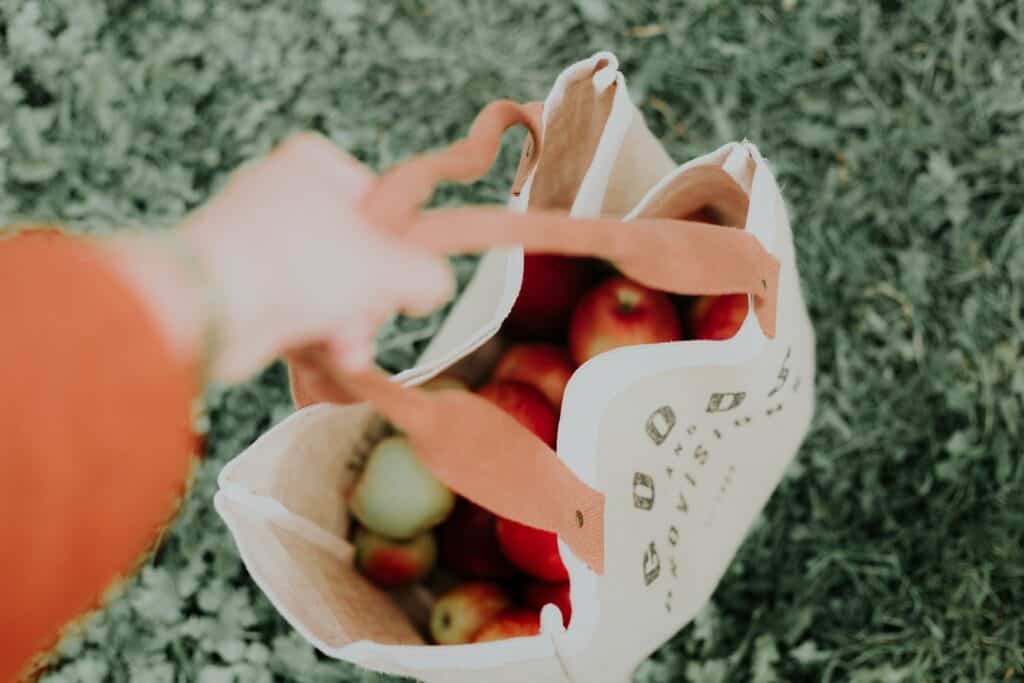
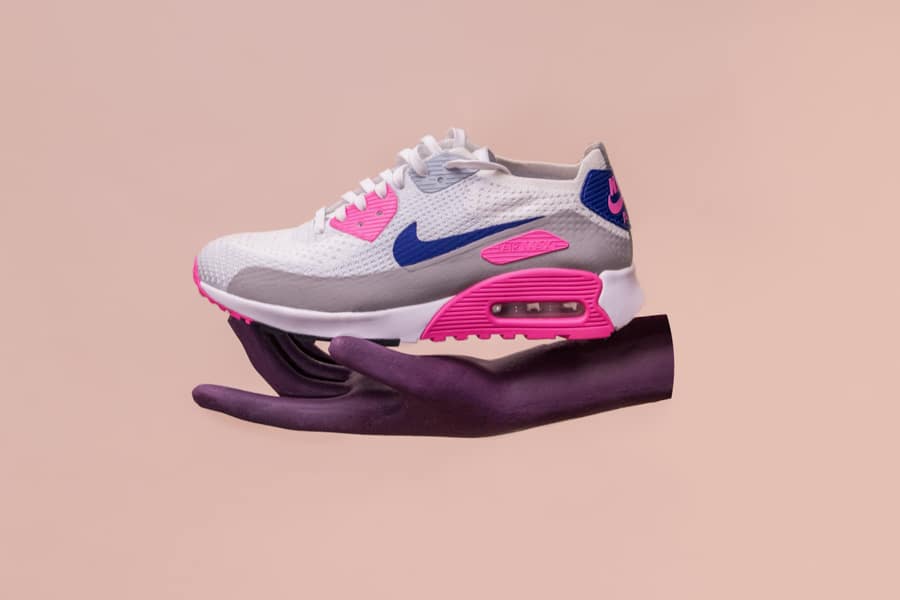
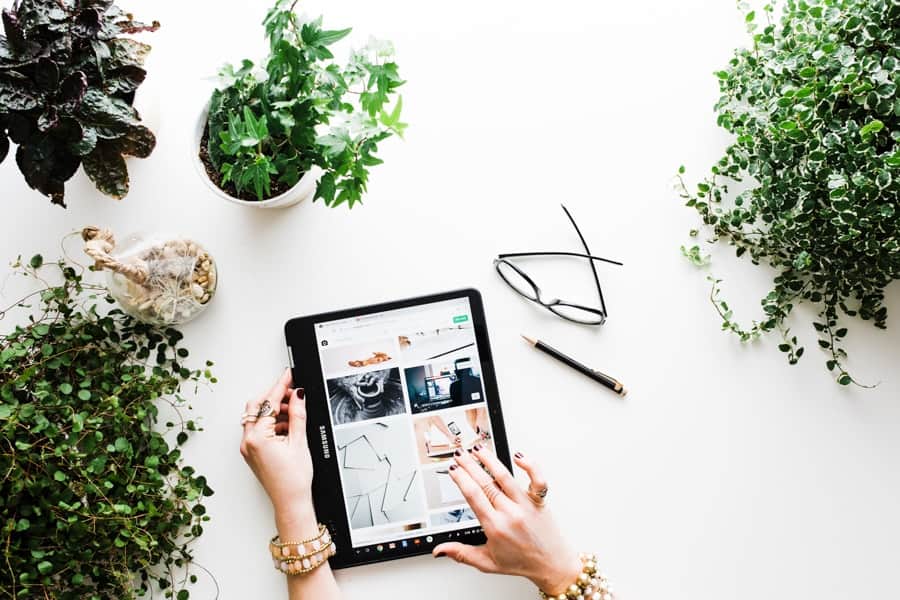
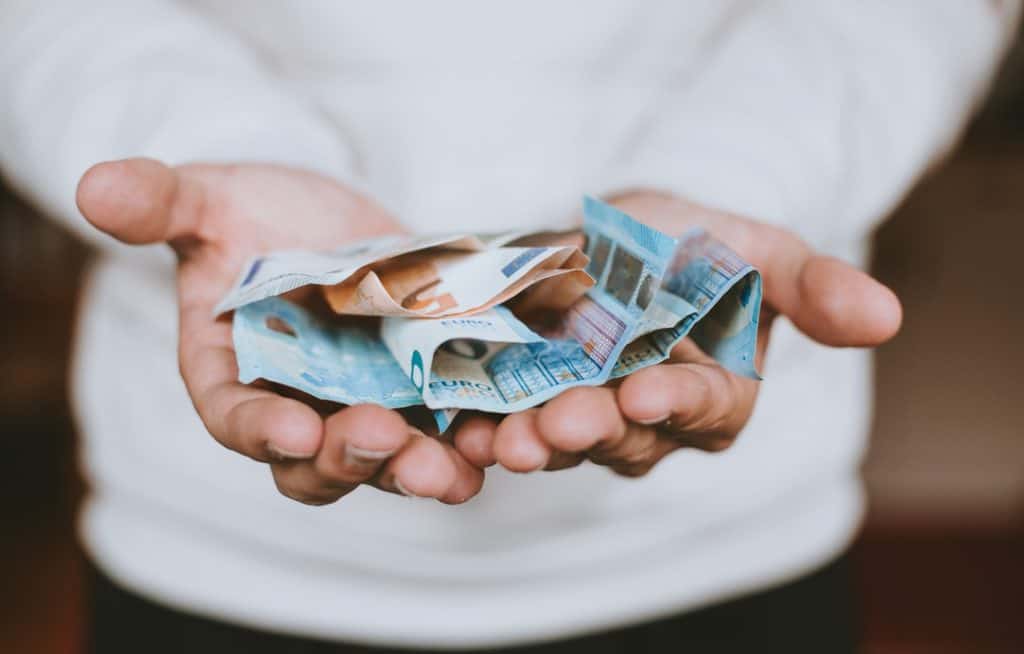
As an American who doesn’t consider them self vegan or zero-waste or anything along those lines, I agree so much with this article. There’s also certain products that just better to buy new. I can’t say I would go out of my way to buy undergarments second-hand or beauty products (depends on the product, if it’s a hairbrush or comb, I would still be iffy but those things can be cleaned and sanitized, but make up, shampoo, toothpaste, etc. are a no-go for me). I truly believe that it fully depends on the brand when buying new. As consumers, it’s up to us what companies we support, and if you aren’t able to buy second-hand, I think it’s worth it to at least take the time to research brand and companies that reflect and support your same beliefs (vegan, cruelty-free, zero-waste, recycling, minimal packaging, etc).
The main reason I shop second hand is because I prefer to shop and keep my money local. I live in America where most products come from China. I work hard at purchasing local, non Chinese products, but it’s difficult. Purchasing second hand gives me many more options as the money I spend on the product stays within my country.
Yup, your approach totally makes sense. Purchasing local and second-hand certainly have their benefits.
FaceBookMarketplace has worked well for me, biggest single drawback for someone who relies on public transport is that goods aren’t all clustered in an easily accessible shopping centre,and I can’t compare quality, colour etc.Nevertheless, I work within the parameters of my beliefs and accept it will be slower and harder this way, and I accept that authenticity comes st a cost (Damn it!) It is what it is!
I really appreciate and respect your commitment. You’re proof that you can make this approach work sustainably. Thanks for sharing.
I just came across your blog when searching for ethical, sustainable clothing brands.
What I really liked about this article and the responses is that it is written very ‘open’ and honest.
Lately, I am more and more interested in what ‘veganism’ is and means. I would love to learn more about it, but at the same time I don’t want to spend a lot of time on the internet (reading more about veganism).
I would love to make the transition to veganism in the future. However, in this stage I see more the ‘problems’ (I’m currently living at my grandparents’ place > non-vegan food! etc.) / the ‘convenience’ of not thinking much about it.
Sorry to be talking about myself this much: I felt encouraged by the comment section > (when you talked about having an open conversation with non-vegans).
Love your blog. Love from the Netherlands. 🙂
Hi Robin, I’m just catching up on comments. I get it. There’s the fine balance of over-consuming information and living your life—but it sounds like you’re mentally preparing yourself for transitioning which is encouraging! Oh, and you’re in the Netherlands. I hear there are so many vegan options there! Thanks for sharing your experience with us 🙂
I would like to chime in on the second hand leather topic!
As you mentioned, if we as vegans consider “leather-like” styled items okay, then that would go against the argument that what we wear influences trends as from afar people who are susceptible to that can’t tell the difference.
I am one of the vegans who considers second hand leather the most ethical option, as prolonging the life of a product is kinder to the environment, but that isn’t the main reason. The main reason is that through wearing second hand leather I find it easier to connect with non vegans and also to have a segway into talking about ethical shopping. Allow me to explain.
Non-vegans discard veganism for a variety or reasons but one of them is what looks to them as “senseless purism”. It isn’t helpful to treat non-vegans in a patronising way, and most people aren’t so simple minded as to not understanding nuances. So when I wear my SH-leather, and people comment on them, I always take the opportunity to mention “Why thank you. I’m actually vegan but I think it is okay to buy second hand animal products for environmental reasons.” And as all is vegans know it is usually unwelcome to talk about veganism but I’ve found this almost always catches people’s interest. Probably because almost everyone thinks buying second hand makes sense, so this has always worked as a bridge for me. It is probably appealing to non-vegans too to have a way to buy leather which is a bit unfortunate but a huge win if I get someone to transition to getting more or even all their leather second hand and refusing to buy new leather on ethical grounds.
I have actually found in my personal interactions that staying “pure” usually confuses non-vegans. As said (apart from those who just are defensive which I usually have success with through first finding common ground and taking care to not make them feel attacked) they think it is patronising when it is to not ‘muddy the waters’ for them because it is like simplifying a concept for appearances sake. They also feel confused when purity clashes with other important philosophies like environmentalism. All these things together have convinced me that second hand leather is in fact not just okay but an important tool. It is entirely possible to have a people become against animal cruelty while having them simultaneously understand that using up available animal products in the service of the environment doesn’t betray that.
I apologise for the lengthy post. My point is that we have to work towards promoting veganism in a rational and realistic form, rather than pure and simplistic. Not only because the reality of things call for it but also because sometimes the simply and pure form also is simpler to discard when the complexities are brought up but not addressed. I do believe that anyone who is open to it can handle that complexity and more often than not, in my own personal experiences at least, admitting the complexities and offering the most ethical *compromise* is what has made opponents open up to the idea as they felt it became honest to them.
Hi Jacob, thank you for taking the time to respond. I think you make some really interesting points.
I too am a big believer in making veganism approachable and relatable when interacting with non-vegans. I also never assume people don’t understand the nuances of leather.
I agree that SH-leather is a useful tool to provide an option for people interested in a vegan lifestyle. However, in my experience, I’ve had similar success promoting “vegan leather” alternatives. Because you’re right, people still ask because leather/vegan leather look the same. This is an opportunity to show people that there are alternatives. I also explain how many options are not sustainable, again, being realistic about what’s available. But I also explain the impact of animal skins—which is a cruel and unsustainable practice in its own right. I wouldn’t say these conversations come across as condescending, but more enjoyable for both parties to consider all aspects.
In the end, I understand why vegans would be comfortable wearing second-hand animal fabrics (like my vegan wife), especially when you consider the waste. But I do believe both situations can result in positive discussions as a result of how we represent and brand ourselves as vegans.
Thanks for chiming in and contributing to this article–I love discussions like these with multiple perspectives 🙂
Every object we need has already been purchased by someone who no longer needs it. The challenge is to find it.
I appreciate your deconstruction of the “to buy or not to buy second-hand,” thanks for sharing it! Over the last 15 years, I have done hundreds of peer-to-peer transactions on Craiglist (online classifieds) and other resale platforms, plus our local Buy Nothing Project group. Some objects I have resold for a decent price, many I have listed for a symbolic price just to zero-in on people who really wanted the item, and quite a few I have passed on for free. I have never ever had a transaction go badly, and I can count on one hand the ones that triggered any form of annoyance. Some transactions are quick and impersonal, but for the most part they are a great opportunity for community building and simply for meeting fellow humans who share the experience of living in our city.
I don’t know if you have a Buy Nothing Project group in your area but if you do I warmly recommend joining it. They are a fabulous resource!
Hi Brigitte, you’re welcome!
There’s a lot to like about the experience you’ve had in these dealings over 15 years! You have a positive track record, and that has made me feel more secure about exploring second-hand shopping.
I’m curious though, through being connected to these groups/platforms, have you ever found yourself acquiring more things than you need?
And yes, there are some incredibly active Buy Nothing Groups in our city 🙂
Women generally will find a greater selection of clothing second hand than men. After my favorite thrift store for over twenty years closed in early September, I find myself wearing clothing longer than previously knowing that inexpensive replacements are less likely to be found. Shipping costs for second hand clothing may negate the savings, and when the item doesn’t fit, such as when you line dry clothing and others machine dry causing shrinkage, it wastes money. Public transportation in a rural area is not adequate, so I’ve purchased second hand vehicles. Most furniture and decor are second hand. It’s helpful to not engage in shopping new or used as a hobby or to socialize, but to buy items and services intentionally.
Those are some great points, Rhea. I particularly like your last point. Second-hand shopping is power as long as we’re intentional about it. Thanks for sharing, as always 🙂